Last Updated on January 13, 2019 by Nick
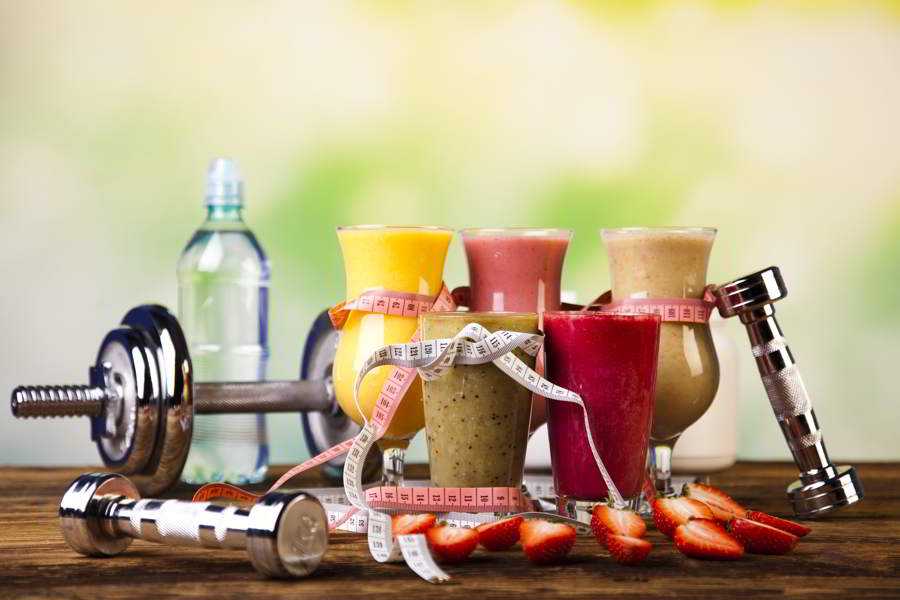
Healthy diet, protein shakes, and dumbells
Below, you can find how to make your own homemade pre-workout supplement, one that does make a HUGE difference.
When it comes to pre-workout nutrition I’m sure you’ve heard enough about C4, Creatine, Beta Alanine, Pre Jym, GNC, or eat this not that, “pre-workout supplements are haremful”, etc.
The question is – HOW do you know which one REALLY works, and which one is a HYPE?
Here’s how:
By looking at what ingredients the most common pre-workout supplements on the market contain, what’s the science behind them, and what they do to your body.
That’s exactly what I did, I decided that it was time to get educated.
How did it go?
It was hell of a research by reading hundreds of studies, but I geeked up and managed to put the pieces together.
The best part?
As it turns out, this research was a HUGE game changer, and below in this post I’m going to share what I discovered.
However, if you are in hurry and looking for natural alternatives to pre-workout supplements, I made this list with my homemade pre-workout stack recommendation:
1 Disclaimer: In the name of full transparency, please be aware that this blog post contains affiliate links and any purchases made through such links will result in a small commission for us (at no extra cost for you). Being a part of these affiliate sales networks makes it possible to fund our website. We only recommend products that our authors consider to be helpful and useful and we always have our readers’ best interest at heart.
Contents
- 1 Natural Pre-Workout Alternative #1 (My Favorite):
- 2 Natural Pre-Workout Alternative #2:
- 3 Natural Pre-Workout Alternative #3:
- 4 Natural Pre-Workout Alternative #4:
- 5 #1 Pre-workout Supplements that are overrated, unnecessary, or have close to zero effects:
- 6 #2 Pre-workout Supplements that are controversial, or have conflicting data and science:
- 7 #3 Pre-workout Supplements no doubt have an impact:
- 8 How The Pre-Workout Supplements Kick In Your Body?
- 9 What Is The Benefit Of Pre-Workout Supplements?
- 10 #1 Muscle Building Blocks And Repairing Body Cells – Protein Powder
- 11 #2 Exercise Performance Stimulants And Energy Sources – Caffeine
- 12 #3 Lean Muscle Mass And Strength Building Supplement – Creatine
- 13 #4 Reduce Burning Feeling In Your Muscles And Increase Workload Potential – Enter BETA-ALANINE (Animals Protein)
- 14 #5 Better Oxidation And Improved Blood Flow – Meet: L- Arginine
- 15 #6 Reduce Muscle Soreness And Fatigue And Skyrocket Your Recovery – BCAAs The Overrated Magical Supplement You Must Have
- 16 #7 Primary Sources Of Energy – Raise Your Blood Sugars Quickly (or slowly) – Simple vs Complex Sugars – Dextrose Glucose Fructose And Maltodextrin
- 17 #8 Improves Focus And Alertness: Positively Regulates And Enhances Nitric Oxide Production – Theanine
- 18 #9 Reduce Muscle Fatigue, Increase Your Blood Flow And Get Bigger Pumps – Citrulline Malate
- 19 Over to you
Natural Pre-Workout Alternative #1 (My Favorite):
- 50-200 mg caffeine (alertness mode)
- 100g frozen strawberries (rich in fiber to avoid blood spikes)
- Greek Yogurt (rich in protein and decreases stomach issues)
- 300 ml water (to digest and absorb the food easier)
- 1 tbsp honey (steady release of glucose into the blood)
- 1 tbsp of peanut butter (sustained release of energy)
Natural Pre-Workout Alternative #2:
- Oatmeal
- 300ml skimed milk
- 2 whole eggs and 1 egg white
- 1/2 banana
- Apple
- Raw honey
Natural Pre-Workout Alternative #3:
- Tablespoon of almond butter
- Slice of Ezekiel bread with avocado
- Grapes
Natural Pre-Workout Alternative #4:
- Powdered peanut butter
- Spinach
- Kale
- Almond milk
These are just few examples of natural pre workouts you can make but I have plenty of other alternatives below for every taste.
But before we do that, I wanted to touch some important takeaways and how the research was conducted.
So here it is broken down step by step:
- Find the common ingredients used in the pre-workout supplements on the market
- Take them on a science research roadshow
- Read hundreds of studies
- Ditch the ones that are hype or have no benefits at all
- Keep the ones that actually work
- Find natural alternatives for each
- Test them personally and share the results
Think about it for a second, the supplement manufacturers have squeezed every single ingredient on the planet that can be associated with aerobic exercise.
With that in mind, by conducting my research, I’ve come to these findings (and I have science-based facts to back up all the statements):
#1 Pre-workout Supplements that are overrated, unnecessary, or have close to zero effects:
- BCCAs (Marketing Hype, your body is full of BCCAs)
- Maltodextrin (Complex Sugars)
- Dextrose (Simple Sugars)
- B Vitamin (Does not help as pre-workout)
- L-Tyrosine (promoted as adrenaline and dopamine booster but the science says: No!)
#2 Pre-workout Supplements that are controversial, or have conflicting data and science:
- L-Arginine (converts to Nitric Oxide but oral supplementation doesn’t help)
- Betaine (unreliable results, only a slight increase in workout performance)
- Taurine (not enough research)
- Beta Alanine (unreliable results, only a slight increase in workout performance)
#3 Pre-workout Supplements no doubt have an impact:
- Proteins Powders~30 to 40 grams (muscle building blocks)
- Carbs – glucose (blood sugar) ~30 to 40 grams
- Caffeine (energy booster) ~50-200 mg
- Theanine (positively regulates nitric oxide) ~200 mg
- Creatine (our body produces it on its own but sometimes not enough) ~5gr
- L-Citrulline (skyrockets Nitric Oxide) ~8 gr
Long story short, I decided to include all the natural alternatives to the most common pre-workout supplements, even for the most skeptical guys and gals.
That said let’s take another look at my favorite all natural pre-workout shake and find an alternative to each item below:
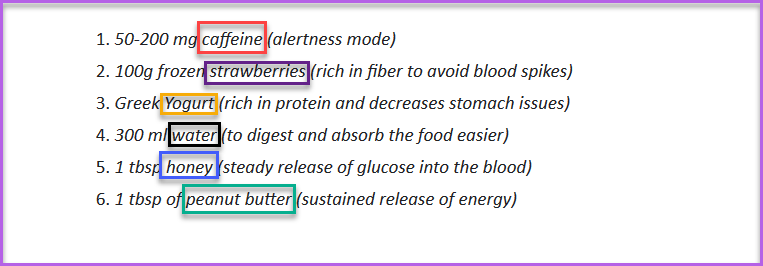
alternatives to #1 (Caffeine):
- Green Tea
- Licorice Tea
- Ginseng
- Organic Dandy Blend
alternatives to #2 (Strawberries):
- Apple
- Banana
- Oranges
- Dried Fruit
alternatives to #3 (Greek Yogurt):
- Any protein-rich food:
- Chicken
- Turkey
- Eggs
- Tuna
alternatives to #4 (Water):
- Milk
- Cold Tea
alternatives to #5 (Honey):
- Nothing beats honey 🙂
alternatives to #6 (Peanut Butter):
- Almond Butter
- Sesame Butter
Bottom line it all comes to this:
- Protein-rich food of your choice (preferably easy to digest, like greek yogurt)
- Carbohydrates (simple carbs 15 minutes prior to workout, or complex carbs 1 hour prior)
- Caffeine (cup of coffee, pills) or Caffeinated Peanut Butter (Green Tea as alternative)
- Creatine rich food (beef, red meat, seafood) during the day or the night before
- Beta-alanine (Nope)
- L-Arginine (No way!)
- Betaine (Nope)
- L-Tyrosine (Hype)
- Taurine (error 404 not enough science data)
- Citrulline malate (shut up and take my money – Yes)
- BCCAs (big No-No)
- Theanine (Gimme that- Yes)
Pre-workout supplements that might be hard to get just by your diet but have proven impact on our workout performance:
- Creatine
- Citrulline Malate
- Theanine
Good news is that Creatine and Citrulline Malate are produced by our body, the bad news is that our body doesn’t hit the clinically effective dose a supplement can, to get the benefit when working out. Meaning, if you don’t have the proper dosage in your body you don’t see the effect.
However It’s not a game over, I shed some light below for each, so keep reading.
How The Pre-Workout Supplements Kick In Your Body?
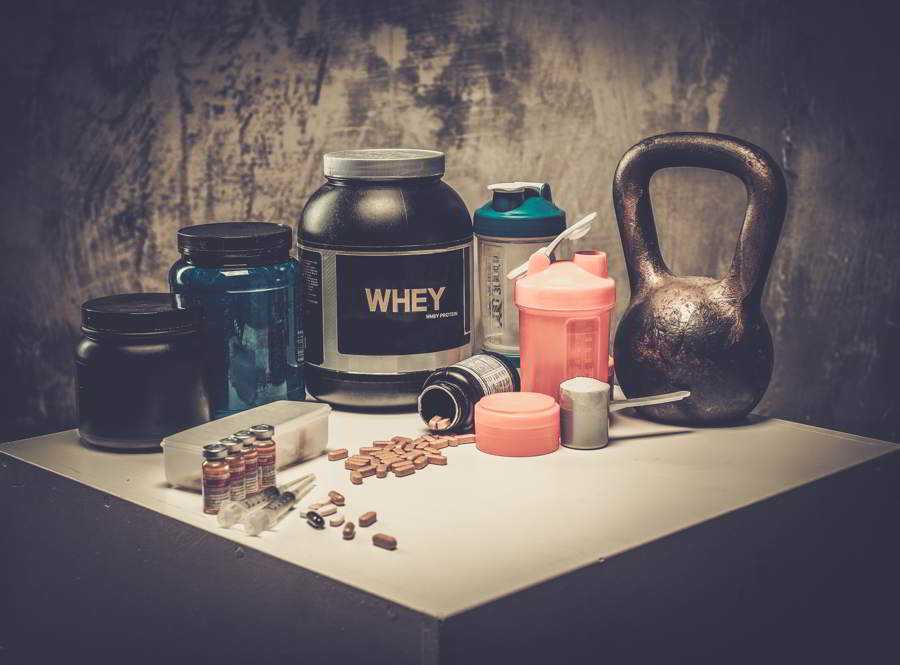
Basically, they are rich with super targeted ingredients, each should be absorbed fast in your body pre or during your workout, sometimes even hours after (growth and re-fuel phase).
The most common effects they produce are as follows:
- Energy boost – increased strength and aerobic performance and reduced fatigue.
- Better oxidation – forcing the body to use the fat as a fuel for energy.
- Muscle targeted – increasing muscle endurance and reducing the soreness, and promoting the growth hormone.
- Brain and motivational boost – better mood, mental focus, alertness and concentration.
So how can we simulate all that only by using all natural food? Not easy, but doable.
The idea behind this research was to get as close as we can to hit the numbers disclosed on the PWOs labels and understand what are their benefits, at least the most common ones. At the same time to give you an idea what to avoid that might be harming your body.
What Is The Benefit Of Pre-Workout Supplements?

Pre-workout supplements come in different shapes and sizes but they have one thing in common performance-enhancing stimulants and ingredients. Starting from improving muscle endurance, up to boosting mental task performance.
By observing different brands, their ingredients and the science behind each I’ve come to the following conclusion. They all fall into two phases. First one is the “Waking and Shaking” phase and the second one is “Prevention and Growth” phase.
It all comes to this:
Better oxidation while exercising burns fat and increases muscle strength. That leads to “waking up” of your entire body, including your brain function. Which helps in increasing alertness, attention and concentration.
Think – motivational kick to jumpstart your workout and a bullet fast energy boost.
That’s just one purpose of the PWOs.
Another important phase is prevention and growth.
Meaning, the ingredients found that directly prevent muscle breakdown, promote protein synthesis and the ones increasing the growth hormone. Extremely important for hardcore workouts or longer aerobic exercises. More you stress your body, the more it requires proper nutrition.
Before, during and after the workout session.
Overall the idea here is to feed your body with wisely chosen ingredients. Majority of these ingredients are already found in the food you consume daily (if you stick to proper diet plan), while others can be produced naturally by your body, like creatine or beta-alanine for example.
Also worth mentioning is the fact when it comes to manufacturers of PWOs is that not all the ingredients, and the dosage are fully disclosed.
While I don’t entirely agree, some exercise psychologists would argue that it all comes down to perception or “tricking” your mind, when you take PWOs and nothing else. Either way, motivation is what matters at the end.
How you going to get there, makes no difference, however, you do need a proper nutrition and a workout energy boost.
The best workouts I’ve had were always the ones when I got enough sleep and I ate the right food, especially the meals I had 30-45 minutes before hitting the gym or doing my HIIT. And sometimes even cup of coffee and half a banana does the job.
So let’s break the most common ingredients found in pre-workout supplements, their purpose, and their natural alternatives.
#1 Muscle Building Blocks And Repairing Body Cells – Protein Powder
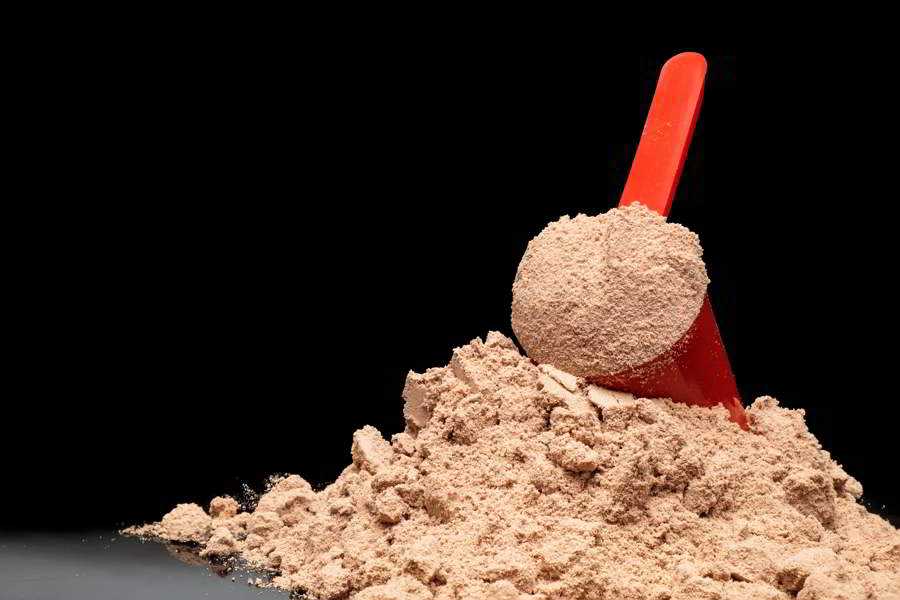
The most common ingredient usually comes in shape of whey protein or casein. This is not rocket science. Protein has amino acids which are major muscle building blocks. While you stress your muscles you cause muscle breakdown.
If your body doesn’t have enough protein you are basically hurting yourself. However, the protein synthesis happens during the entire day.
Meaning, even if you took just enough protein 3 hours prior to workout, your body might be safe. It takes hours before the protein breaks up into your body entirely (this is linked to slow vs fast dissolving protein and the peak of each).
Do you need a protein shake? Of course not, as long as you can meet your daily requirements while consuming natural food. Every type of food rich in protein will do the trick in this step.
For my pre-workout, I prefer tuna, cottage cheese or just a cup of greek yogurt.
Each meets my personal preferences and requirements:
- Easy to Digest
- They don’t require time to prepare (cooking for example)
- Contains fast dissolving Whey protein AND slow dissolving Casein protein.
- Rich in proteins (per pound)
- You can buy them in every store
- Cheap, all natural and they taste delicious
Pay attention to the item under #3, since that’s if not one of the most important takeaways in this checklist. Even if you remember only that one, you are still ahead of 90% of the people and you’re actually helping your body the best you can.
Here’s the deal:
Best case scenario, you were playing smart and you included both fast and slow dissolving proteins within your pre-workout meal.
Why is this so important?
Fast dissolving proteins (and you probably guessed it by the name), make the protein synthesis happen straight away.
So you got yourself covered during the workout (or at least a part of it).
The longer the session is, the harder you fight against yourself and your body. The more pressure you put the more you rip your muscles. You need to feed them properly. And not just during the workout, but after as well.
This is where a protein like casein comes into play. It dissolves slowly so the recovery period that comes after the workout (we talking hours here), is crucial. That’s when the growing phase happens.
Casein it the real deal here. It’s your body’s best friend.
Whey protein kicks in fast and it’s absorbed 8-10g/hour and it stimulates the protein synthesis faster, but on the other hand it doesn’t work well to prevent protein breakdown.
Casein does exactly the opposite. It causes slow protein synthesis, but the good news is it prevents protein breakdown for up to 7 hours.
Bottom line, my recommendation is to include a mix (1:1 ratio will do just fine) of both slow and fast absorbing proteins in your pre-workout.
Action Plan: Make sure to include 30-40 gr of protein prior to workout.
Here are just several foods high in protein:
- Greek Yogurt
- Avocados
- Cottage Cheese
- Swiss Cheese
- Eggs
- Milk
- Steak
- Ground Beef
- Seafood
- Sardines
- Peanut Butter
- Nuts
- Quinoa
#2 Exercise Performance Stimulants And Energy Sources – Caffeine

Caffeine is the winner here, there’s no question about it. It has plenty of benefits that we are all familiar with, but when it comes to pre-workout it’s a great energy weapon.
Caffeine Increases muscle endurance and strength, causes a metabolism boost, hikes up your performance and focus and may boost your memory and thinking skills.
If you want that 100% focus and alertness mode, and up your energy levels fast, I highly recommend including it in your natural pre-workout stack.
Foods and drinks rich in caffeine:
- Coffee
- Green Tea
- Chocolate
- Ice Cream
- Caffeinated Sunflower Seeds
- Caffeinated Cookies
- Caffeinated Coffee Flavored Cereal
- Caffeinated Peanut Butter
Until recently cup of coffee or caffeine pills were my favorite energy booster, now I’ve been playing with Caffeinated Peanut Butter and I love it. Also, peanut butter itself is a great natural PWO choice to keep your energy levels constant.
Word of warning, peanut butter is high in fats. If your goal is to lose weight and you’re on a low-fat diet, it might be better for you to stick just with the caffeine, and reduce your fat intake.
Sensitive to caffeine, or just looking for stimulant free alternative?
No worries I’ve got you covered.
Best natural energy replacement for caffeine that can be used as a pre workout:
- Licorice Tea
- Ginseng
- Organic Dandy Blend
#3 Lean Muscle Mass And Strength Building Supplement – Creatine
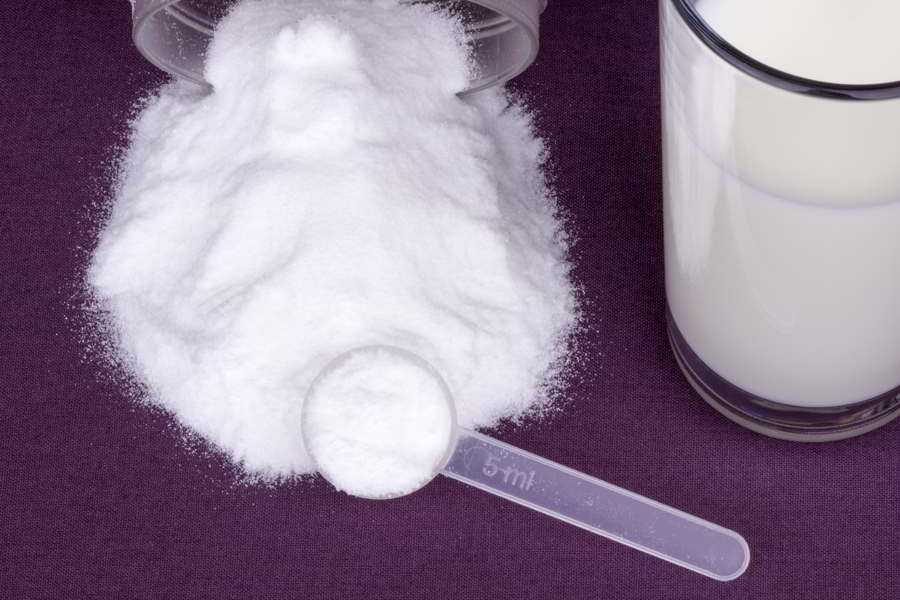
This is by far the most controversial topics when it comes to PWOs. It all boils down to this, there are two types of studies out there with emphasis on long-term safety.
One with findings that creatine can be harmful to some people and the other that’s mostly focusing on the benefit and the incredible power this amino acid has as a strength building substance, and how it helps with the protein synthesis.
Think – Lean Muscle Mass.
Creatine by itself is all natural since it’s made by our body. However, there’s a quantity difference produced from one body type to another. Regardless, the way it works the same.
Recommended use of creatine comes in two phases. One’s called Loading phase, and the other’s Maintenance Phase.
The loading phase is the first phase that lasts about a week while you consume around 3-5 grams of creatine monohydrate per day. When your body gets enough of it, part is stored in the muscles and our body uses it in duration or 2-3 days, as an energy source.
Then you go with the maintenance phase which means taking around 3 grams per day for the next 3-4 weeks. Then you do a 4 weeks break.
Creatine off month.
Keep in mind this is a highly controversial topic, so take everything with a grain of salt. There are studies done with responders vs. non-responders to creatine and the data is really controversial. Long story short, not all can see the benefit of it nor need that amount per day.
Another study suggested increased anaerobic working capacity in women when the loading phase lasted for 5 days and was consumed 5g/day. The other group’s loading phase was in a duration of 2 days and no improvements were recorded.
The best way is to experiment with your body and see what dosage and cycle work for you. That being said, you might want your creatine levels to be up (if you lack energy and you’ve done everything else by the book) when doing weights or cardio training.
What are the Natural Alternatives to taking creatine supplement?
The bad news is that if you are vegetarian or a vegan you can’t find it in the fruits or the veggies. Good news is that your body produces it on its own. I’ve been off with creatine supplement for a long time and I haven’t seen much of a difference.
Maybe on extremely hard sessions and days, but I can’t associate it directly with creatine.
So there is a great natural alternative to taking creatine powder for you, and it’s simple – not taking creatine at all. In case you love meat I have a great study and findings to share with you. So keep reading.
A study was made to investigate what is the benefit of Absorption of creatine supplied as a drink, in meat or in solid form.
What were the results?
Well, I made a nice visual (not my proudest artwork have to admit but here it is):
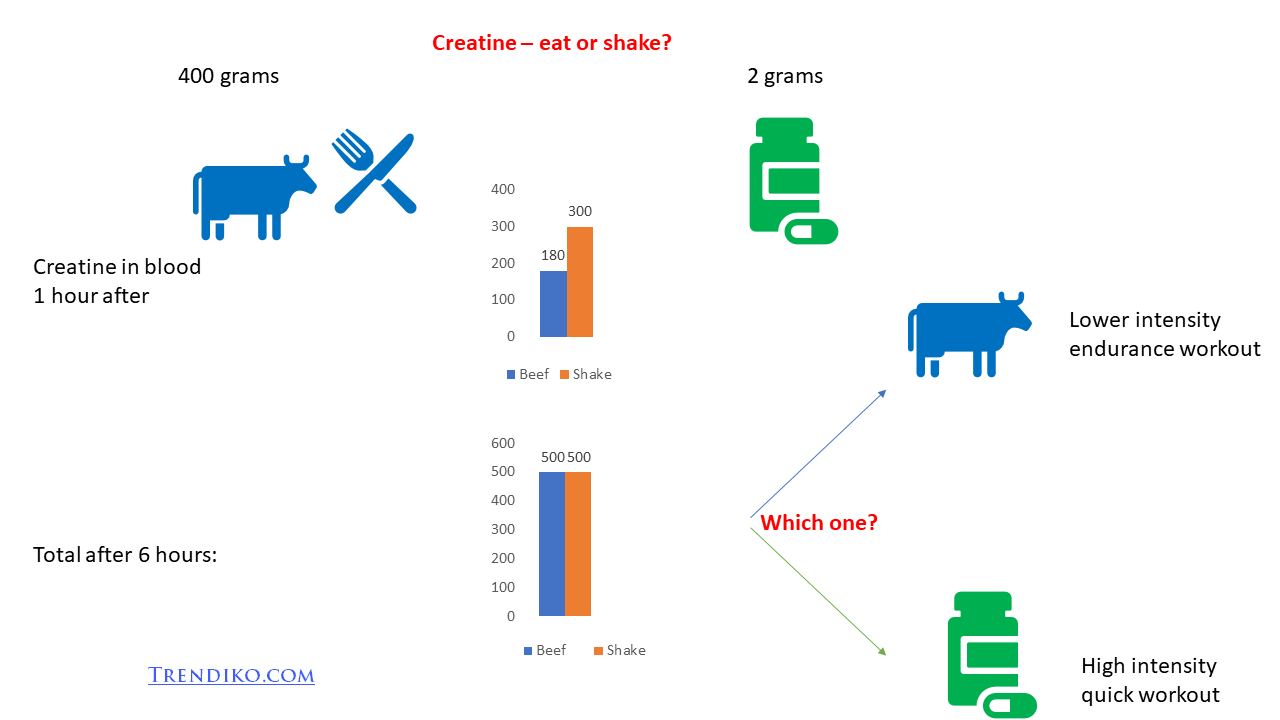
The study was conducted with 2 gr of creatine, either contained in a 400 gr meat or supplied by a drink or solid form. The participants were observed in a time frame of 6 hours.
The conclusion was:
When doing HIIT and consumption of creatine 1 hour prior to working out, you are better off with creatine in a supplement form. However, when doing a lower intensity endurance workout – meat works just fine. The absorption is the same, but getting it through meat may result in a slightly lower peak in your blood.
But here’s the catch, as you can see by the image the concentration is the same when they both hit the 6 hours mark.
The problem is again the same- the dosage.
Typical supplementation process with creatine looks something like this – 5g/day for 4 days- Loading phase, then comes to the Maintenance phase – 3gr/day.
In short, that’s a lot of meat, and if you’re performing HIIT you need to try to get as much as you can 6 hours prior to working out. However, if you aren’t a huge fan of taking creatine as a supplement and if you love to eat red meat, this is a good alternative.
Foods rich in creatine:
- Beef
- Salmon
- Tuna
#4 Reduce Burning Feeling In Your Muscles And Increase Workload Potential – Enter BETA-ALANINE (Animals Protein)
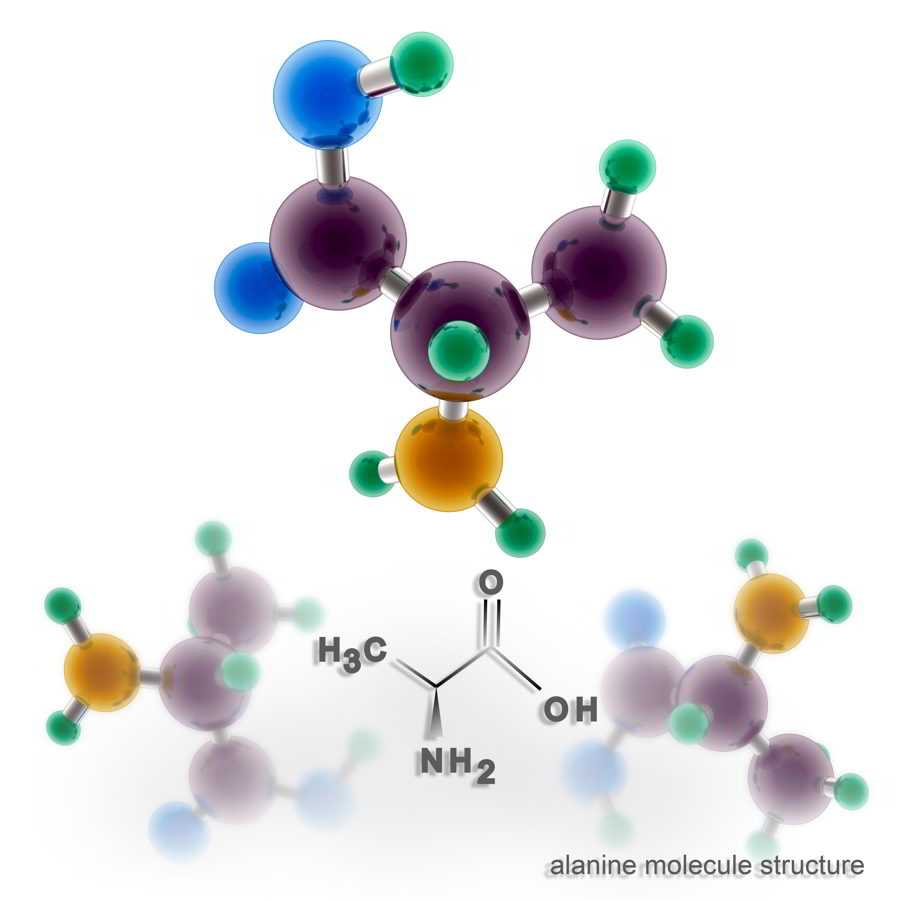
First and very important fact, our body produces beta-alanine by its own. The burning sensation when you’re exercising and doing heavy sets? That’s lactic acid. One way to prevent and defend against it, is exactly, beta-alanine.
More importantly, carnosine.
Carnosine + Anserine + Balenine = Increase in beta-alanine
Second, from the three molecules mentioned above, carnosine has the highest impact.
Here’s definition of each taken from Wikipedia and PubChem.
Carnosine:
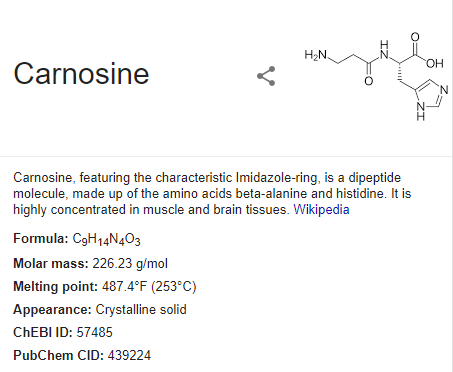
Anserine:

I have to admit, this one doesn’t sound sexy at all.
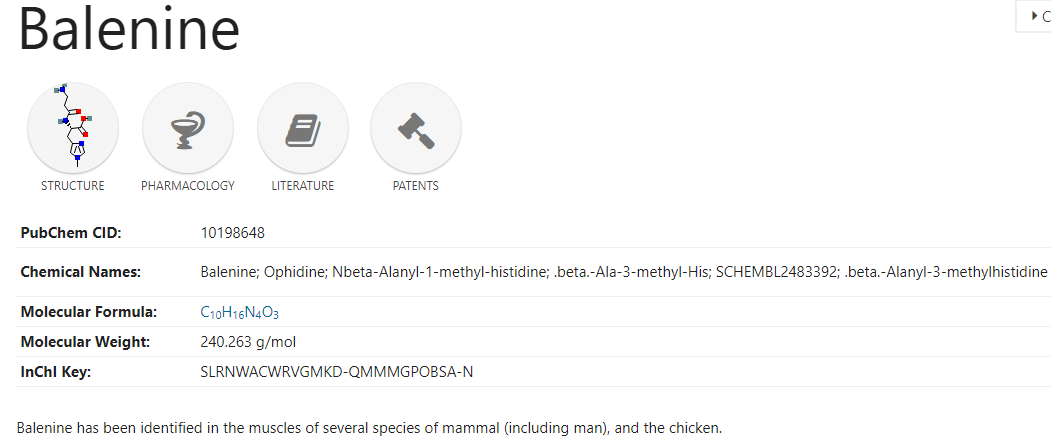
In case you can’t read the text in the image this is what it says:
“Balenine has been identified in the muscles of several species of mammal (including man), and the chicken”
Enough boring definitions, let’s get to the actionable part.
Carnosine is what we should be focusing on since that’s what moves the needle. By far one of the best sources of carnosine is again, meat. Turkey, Beef, and Chicken.
But here’s the deal breaker when it comes to getting beta-alanine from food:
You’ll need to eat at least 100gr of turkey breasts just to get ~0.5g or 500 mg of carnosine.
Just for comparison, most of the well known pre-workout supplements on the market have between 2-4gr in one/two servings.
I know what you are thinking, that’s almost impossible, nobody can eat 400gr of turkey before going to the gym. That just doesn’t make sense. And you are right.
But the question that pops up is – Do you actually need 2gr of beta-alanine at first place?
Nope, not at all.
That’s just marketing hype, that contradicts every single study I found regarding this “magical ingredient”.
According to the supplement manufacturers and the “experts” Beta-alanine “should” be consumed the same as creatine. You have loading phase usually entire month of it. Consuming every single day around 4-6 gr, just to get “loaded” so your body can store it and use it. Then comes the maintenance phase.
And what will be the effect of it?
Close to nothing. Crickets.
Maybe a slight improvement when doing your HIIT, or just one extra rep at the end of the day. That’s it.
Here’s the proof: https://www.ncbi.nlm.nih.gov/pubmed/25510839
Here’s another one: https://www.ncbi.nlm.nih.gov/pubmed/22270875
And here’s what one of the most brutally honest guys, well known in the bodybuilding community has to say about it:

I’m not yet convinced, give me my list of natural alternatives that contain beta-alanine.
Here’s a list of beta alanine-rich foods:
- Pork shoulder and legs
- Turkey breast, leg, pectoral
- Chicken breast, thigh, and leg
- Beef shin, top side
It’s like watching “The Walking Dead” 🙂
#5 Better Oxidation And Improved Blood Flow – Meet: L- Arginine
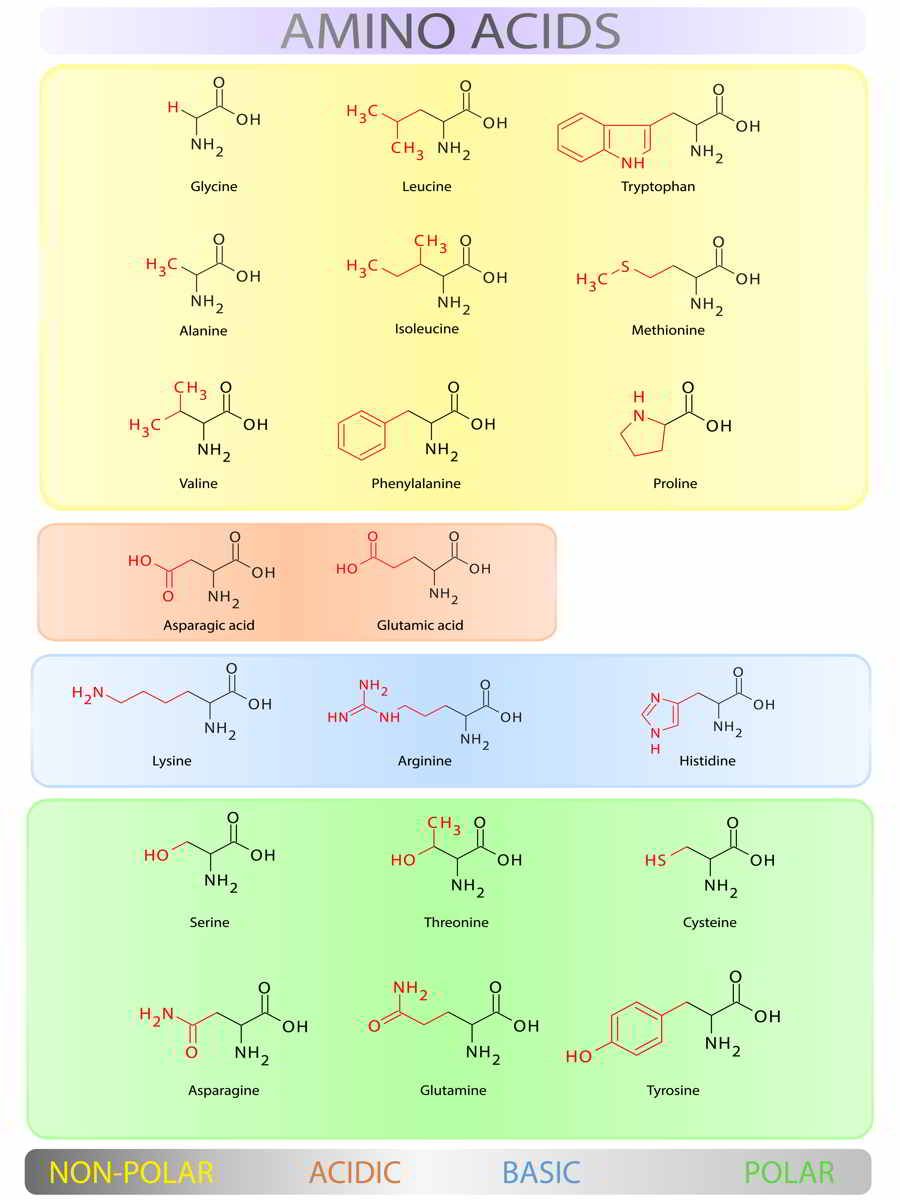
Improved blood flow helps the muscles to get the necessary nutrients delivered. This happens when L Arginine, which is a non-essential amino acid and produced by our body, is converted into Nitric Oxide. Increased Nitric Oxide causes: muscle pump, stimulates the growth hormone, and it improves the exercise performance.
That said, it’s pretty obvious why the supplement companies put a lot of emphasis in the marketing of Arginine and are often found under the pre-workout category. Again good news is that we can easily get it from different food sources, …and a lot of it.
Now for the controversial part, the science vs real-life examples. Well, making the right call here is not easy.
Let me explain.
Some athletes and bodybuilders, including close friends of mine, claiming that effects are noticeable. Especially the pump part. Personally, I can’t say the same for myself.
Let’s talk science.
The benefits of increased Nitric Oxide are proven, no question about it. It expands the blood vessels, increases the oxygen and the blood flow. I don’t have a problem with that. I have a problem with L-Arginine. Since that’s what the supplement companies are selling.
Not Nitric Oxide, which is basically a gas. But they like to market it as such.
That said, the only positive studies I found where there’s a direct correlation between L-Arginine when taken ORALLY and workout performance, are the ones that apply only to unhealthy individuals.
According to a study conducted on fourteen strength trained males, L-arginine ingested before resistance exercise attenuated plasma GH (Growth Hormone) in those individuals.
Another one was made with cyclist and the results showed that the acute ingestion of L-arginine did not alter any hormonal, metabolic, or cardio-respiratory responses during submaximal exercise.
A new study was performed with soccer players and the conclusion was that no significant effects neither on physiological nor performance parameters with supplementation (including BCCAs).
The problem that pops up when supplementing orally is that your body cannot break it down nor it can simulate the production of it. (There’s a better alternative I cover below).
Bottom line: If you asking me. you don’t need to take L-Arginine as a supplement.
Here’s why:
- Your body produces it by its own
- Plenty of foods super high in Arginine to choose from
- Science can’t correlate it with workout performance when taken orally
In case you still want to give that one a go, recommended dosage is between 1.5 – 3gr, 1 hour prior to working out. Also taking it in a form of a supplement might cause: bloating, stomach pain and possibly even diarrhea.
So if you have a sensitive stomach (as I do), you might reconsider.
Foods high in L-Arginine:
- Peanuts
- Turkey
- Chicken
- Yoghurt
- Cheese
#6 Reduce Muscle Soreness And Fatigue And Skyrocket Your Recovery – BCAAs The Overrated Magical Supplement You Must Have
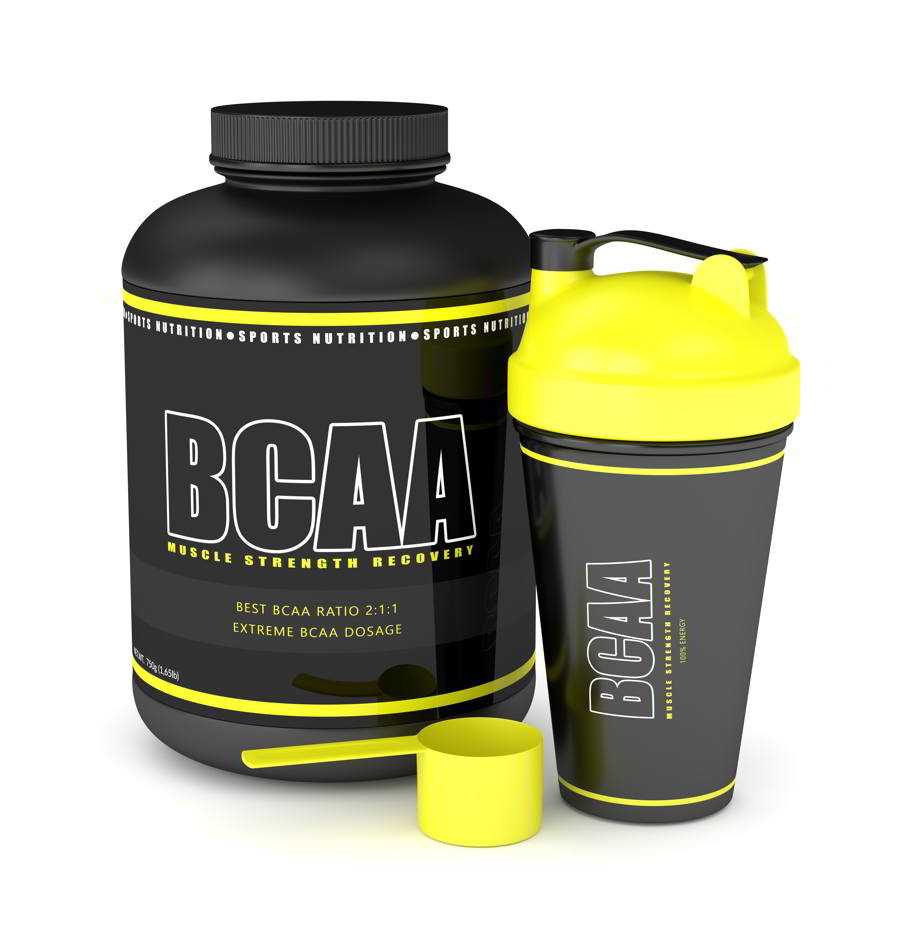
I can easily put this one under the category: What pre-workout supplements to avoid?
It’s simple. There are plenty of foods to choose from that are super rich with BCAAs. The chances are that you are probably already full of these amino acids, just by looking at your diet. If you take enough proteins, supplementation is unnecessary.
Any food that has proteins in it contains Branched Chain Amino Acids.
Keep in mind we are talking here about pre-workout supplementations. Meaning, if you don’t have a proper diet in place, a PWO supplement can’t help you.
I stumbled upon several studies that show a positive correlation when supplementing with BCCA, but only when given in combination with L-ornithine L-aspartate or when taken post-exercise.
One of the studies reveals that supplementation with BCAA and OA is a useful way to improve MCRT during high-intensity exercise and in the recovery phase.
Another one confirms that BCAA only helps with post workout recovery but during physical activity does not improve athletic performance.
There was also a research study when BCCA was given with caffeine, L-arginine, and carbohydrates and it was concluded that there wasn’t any significant effect on the performance.
One study shed lights when it comes to post-workout recovery where BCAAs alone increased the post-exercise stimulation of protein synthesis when taken immediately after resistance exercise.
Another team of scientists decided to compare what happens when you supplement with carbohydrates and what happens when you add BCCA to the CHO while doing lower-body training…well the same story, it did not improve the strength nor the muscle damage and soreness.
Bottom line, in some instances supplementing with Branched-chain amino acid, might help in the recovery process but the effect is usually insignificant.
Even if the science is wrong, one thing is for certain, follow a proper diet and you’ll have more than enough BCCA in your system, during and after your workout.
Food rich with BCAA:
- Chicken
- Turkey
- Fish
- Cottage Cheese
- Eggs
However, if you are vegan or vegetarian there are plenty of vegan BCAA supplement to choose from. My recommendation is to go with this one.
#7 Primary Sources Of Energy – Raise Your Blood Sugars Quickly (or slowly) – Simple vs Complex Sugars – Dextrose Glucose Fructose And Maltodextrin
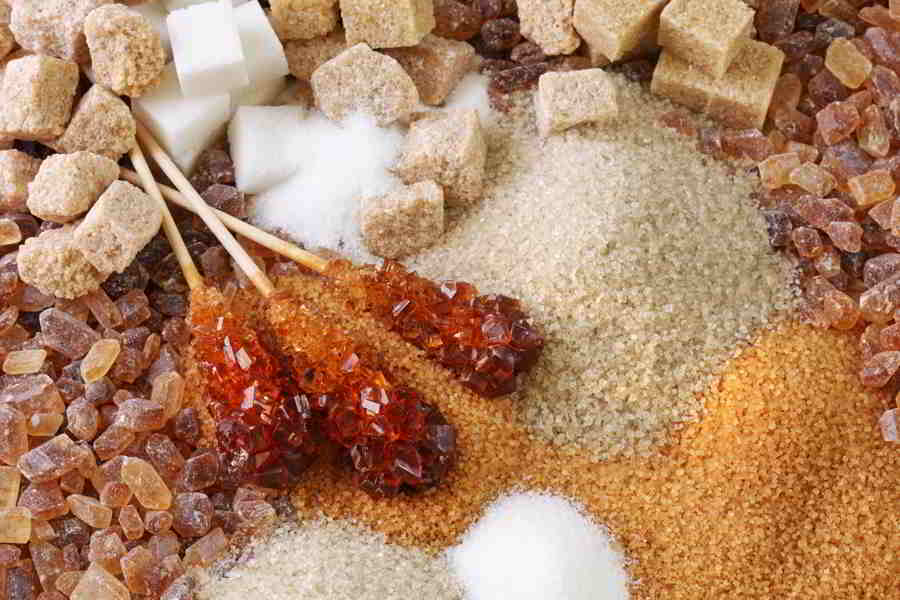
Finding the right Carbohydrates to eat is really important. Especially when it comes to pre or post workout nutrition. The supplement companies are pushing mostly Dextrose and Maltodextrin as a good alternative for an energy boost.
Both have one thing in common:
They are absorbed directly through the gut.
One difference that distinguishes these sugars is that Dextrose stands for simple sugars while Maltodextrin is a complex one. The job of the simple sugars is to raise our blood sugars quickly.
Complex sugars do quite the opposite. The absorption is more slowly, which leads to slowly raising the blood sugars as well.
So which one’s a better option? From a health point of you, the winner is always complex carbs. When it comes to exercising, the best answer I can give it is, it depends.
Here’s why:
If you want to take your food 15 minutes prior to working out, then you need a quick rise in energy and your best choice would be simple sugars.
If you eat 30 min to an hour before you hit the gym, then going with complex carbohydrates is recommended. Another important key factor is the duration and the intensity of your training.
The more intense and the longer the duration, you’ll be better with complex carbs. That will provide your body with all the energy required to do your workouts like a true champion, while helping you maintain your blood sugars level up to a task.
Alternative to Dextrose and Maltodextrin?
- Any simple or complex carb will do the job:
- Oatmeal
- Potatoes
- Slice of white/whole wheat bread
- Fruits
- Milk
- Peanut Butter
- Honey
#8 Improves Focus And Alertness: Positively Regulates And Enhances Nitric Oxide Production – Theanine
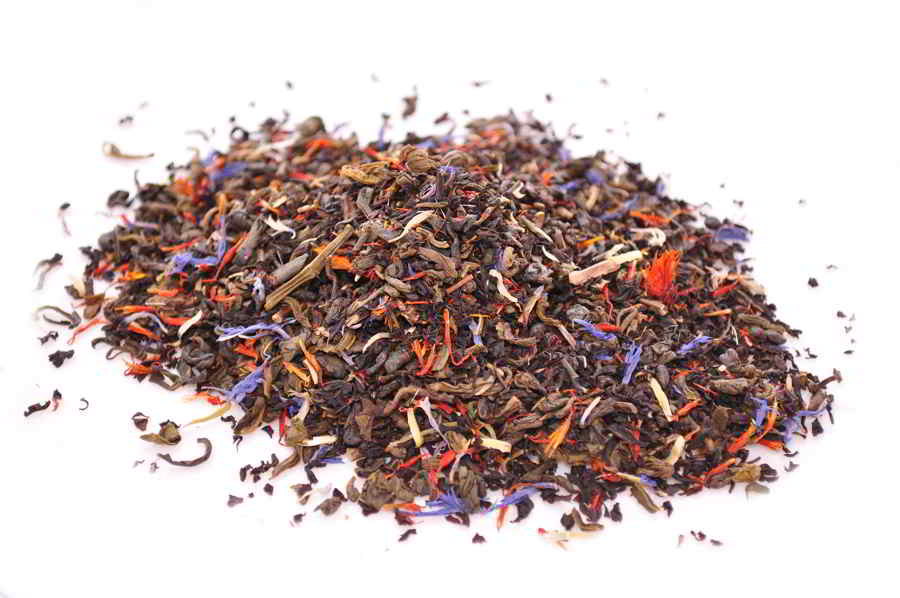
This supplement is definitely what I like to call a must-have. Theanine is one of the best dopamine levels boosters. You and I both know that when dopamine is up – we can do magic. It also fights anxiety and high blood pressure.
When it comes to working out the benefits of including this amino acid into your diet are enormous.
In short, it improves your mental and psychical performance.
It’s a win-win situation.
Starting from enhancing nitric oxide production and improving blood flow, which correlates with better focus and alert mode, up to reducing fatigue and helping your glycogen levels. That fuels your body with energy.
It could be found in several Chinese and Indians teas such as Green Tea or Black Tea that are made from Camellia sinensis shrub or small trees.
However, finding a quality Green Tea with a high concentration of theanine is a different story. Even if you find such, 1 cup of tea has around 20 mg of theanine.
What’s the recommended dosage that makes a difference when working out?
The bare minimum is 100 mg, preferably you would like to hit the 200 mg mark.
So again “Houston we have a problem” scenario. Nobody can drink that 5-10 cups of green tea to hit that number prior to working out. But you sure can drink 5 cups of tea during the entire day. Right?
If you go that road here’s nice visual how to prepare the tea to get the highest amount of theanine possible:

The studies correlate with the benefits of using these amino acids when working out. In case you are not a hardcore tea lover I highly recommend to go with supplementation. It’s basically a powder of leaves, so nothing harmful there.
Tea rich in theanine:
- Green Tea
- Black Tea
#9 Reduce Muscle Fatigue, Increase Your Blood Flow And Get Bigger Pumps – Citrulline Malate
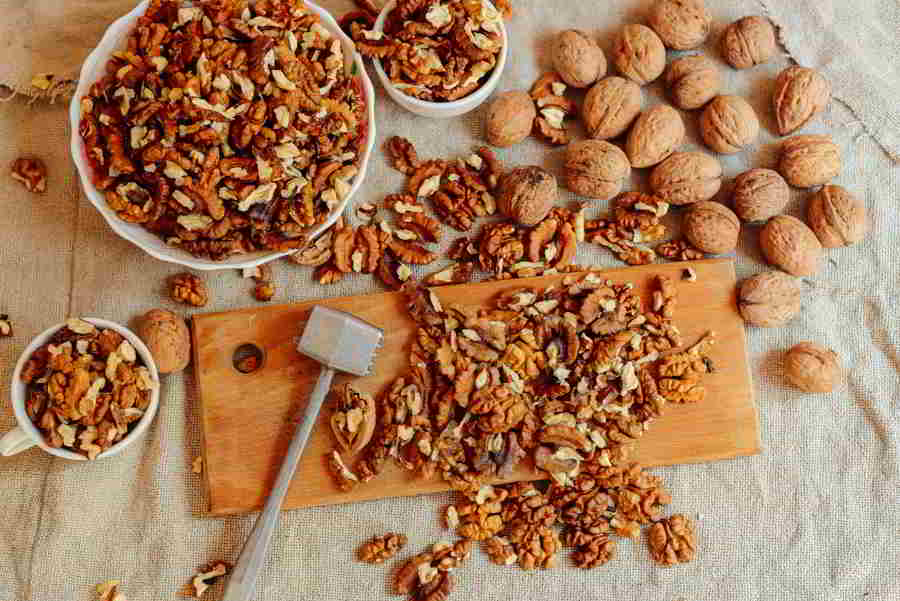
According to Examine.com L-Citrulline turns into L-arginine in the kidneys and it’s far better choice than taking L-arginine supplementation.
Wait, what? That doesn’t make sense.
Why not just take L-arginine instead?
I asked myself the same question. The answer is again – science research studies.
Let me explain.
There have been numerous studies that confirm the same thing over and over again. When you supplement with L-arginine orally your body cannot break it down after consumption the way supplementing with L-Citrulline can.
Meaning, L-Citrulline causes both production and breaking down of L-Arginine easy peasy lemon squeezy.
So what happens next? The L-Arginine skyrockets your Nitric Oxide which helps blood vessels relax and also improves circulation.
What’s the difference between L-Citrulline and Citrulline Malate one may ask?
Citrulline Malate is a combination of Citrulline and a malic acid called Malate. Malic acid is basically a organic compound that is naturally found in fruits.
Should you go with L-Citrulline or Citrulline Malate?
Makes no difference overall, however, most of the workout performance studies are conducted with Citrulline Malate since it’s the most common ingredient found in the pre-workout supplements. If you are skeptical go with Citrulline Malate, there’s no harm nor any side effect.
Here’s a great study that explains how L-citrulline-malate supplementation can enhance the use of use of amino acids and production of creatinine and ornithine.
Anyone love cycling?
There has been another study with 17 professional cyclists who were supplemented with Citrulline and the results show significantly increased plasma concentration of both arginine and citrulline which significantly helped in the recovery phase.
Alternative to L-Citrulline- Nitrate Rich Foods:
- Fruits such as Watermelon or Cranberries
- Walnuts
- Dark chocolate
- Honey
Over to you
So there you have it, my favorite alternative foods to pre-workout supplements. Remember that when working out, most important thing is having a proper plan in place, supplements are just one piece of the puzzle.
Join the conversation below and tell us what’s your favorite pre-workout meal! I’ll be happy to hear your thoughts and answer any question you may have.




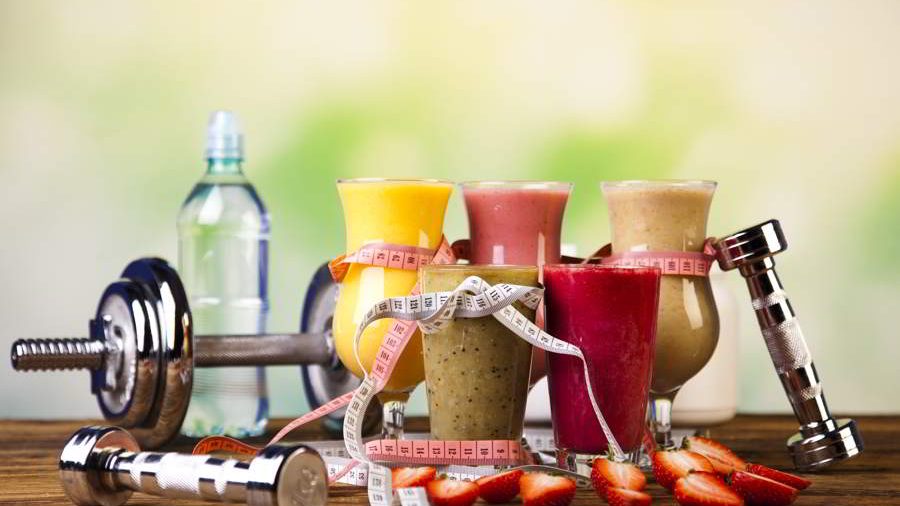
Very very good article. Ive just recently thought about not taking pre workouts because of the random ingredients and high caffeine dosage. I also wanted to find a dopamine booster as natural as possible. Ill be buying theanine supplement and maybe caffeine pills or just straight coffee. Thanks very much.
Thanks for reading Dennis, glad you enjoyed it.
Regarding the high caffeine dosage, that’s a good point. How much is too much, right? Unfortunately, there’s no one size fits all, since everyone has different caffeine sensitivity. However, a good rule of thumb is anything between 3-5 mg per kg of body weight.
When it comes to theanine, its chemical structure resembles glutamic acid. Glutamic acid is basically a fuel for your brain. The major benefits of L-theanine (which is the main extract, or amino acid found in the Japanese Green tea) increases the levels of GABA (neurotransmitters that send messages within our brain and our entire nervous system), and serotonin and dopamine.
Or to put this in perspective, you get the benefit of increased mood and energy, as well as concentration and alertness.
The best part? Oral supplementation does help.
Definitely give it a shot and let me know how it goes.
Yes I use a pre workout supplement which has 400mg of caffeine in 1 serving and another brand with 200mg per serving. They both seem to give me more energy in the gym but at the moment I am cutting down the amount I use and will eventually completely stop. Then I can start with just caffeine pills and theanine at a 2:1 ratio perhaps? I will trial it and see how my body reacts. Today I used theanine powder 200mg with 1 serving of the 200mg caffeine pre workout. Energy was there but my eyes did feel a little tired. I suppose the ratio of theanine was too high compared to caffeine?
I didnt know about glutamic acid. That is very interesting to know. I’m very interested to know of any natural ways to increase serotonin and dopamine safely.
Thanks
Oh and I forgot to mention the first day I read your article, coincidently was the day I bought L-Citrulline powder after trying to find a non stimulant pre work out supplement. More reason why I trust your article. After trying L-Citrulline as a pwo, I was missing the energy.. which I guess is coming from caffeine.
Theanine does not cause any side-effect, and there have been no reports of overdose.
Caffeine, on the other hand, is a sensitive topic and CAN increase the pressure inside the eye and you might be experiencing eyestrain or tired eyes.
However, correlation does not imply causation.
My suggestion is to try to reduce the caffeine intake if you experience the same problem next time you hit the gym.
Also, caffeine can cause dehydration so make sure you drink plenty of water.
The positive side is that caffeine itself stimulates the release of dopamine in your brain and works great paired with theanine.
Serotonin works in conjunction with dopamine. Dopamine is produced to reward motivated behavior, serotonin is a hormone of well being, and happiness or the “feel good hormone.”
There are various ways how you can try to increase both, but this is linked to lifestyle changes, proper diet (yeah I know a cliche), exercising, listening to motivational music, getting enough deep sleep, and so on.
When it comes to specific food you want to focus on (with no particular order): Eggs, Turkey, Almonds, Lentils, Spinach, Bananas, Beef, Broccoli, Oats.
My point is that you CAN “mimic” or “help” your body prior to working out supplementing with X or Y to keep in check all these “feel good” or “reward behavior” neurotransmitters such as the dopamine and serotonin, as well as the adrenaline and noradrenaline that are produced as a response to stress or fear in general.
But, your focus should be more towards lifestyle changes, reducing stress, having a proper diet and routine, setting up goals, and train or supplement your mind with positive thoughts.
And the answer is simple, they come from our brain, and our brain requires repetitive behavior to “reward” us with proper distribution of these neurotransmitters that can affect our mood, sleep, appetite, memory, sexual desire, muscles, etc.
Focus on the big picture, and you’ll see great results, both inside and outside the gym.
Your health will always be your top priority. Always eat healthy and live a healthy lifestyle. Eating the right amount of foods rich in amino acids can help you lose weight and build more protein in the body. Thank you for this great information.
thanks for sharing . I’m not into supplements tho but this will help a lot of those who depends on supplements to achieve the body the wanted
Very great article. Thanks for sharing with us. Had a question for you, in your first natural pre-workout recipe, is it a sort of smoothie/shake your making yourself? I was wondering as well how do you take your caffeine? Is it as pill suplement, as a straight coffee, or even as caffeine anhydrous? I’m looking forward to try this but would like to know how you prepare it. And do you take it 30 mins prior to training
Eating the right amount of foods rich in amino acids can help you lose weight and build more protein in the body. Thank you for this great information.
Great blog, nice content, good read and informative.
There are several supplements for pre work out and I suggest amino acid supplements.
Seems like a good place to start for people just getting into the world of brain supplements.
Thank you for this article on natural alternatives to pre-workout supplements. I am fairly new to the muscle-building routine and have chosen to keep away from artificial supplements and this list of natural alternatives is very helpful.
thanks for the excellent ideas you put into your blogs! This is such a great read 🙂